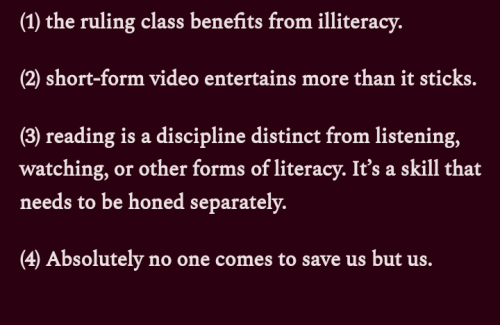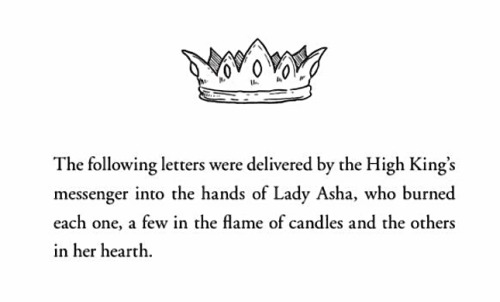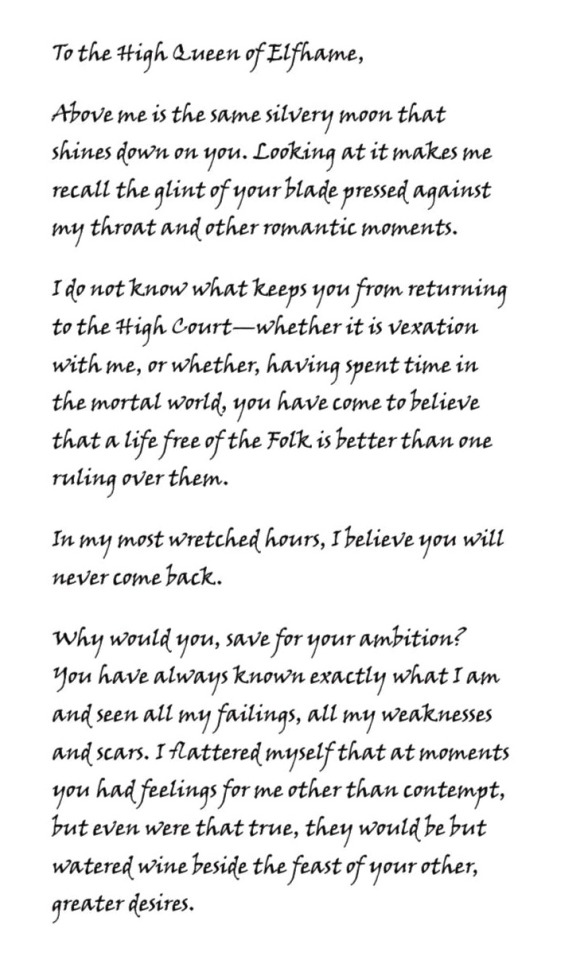- Emory Hall, "I Have Been A Thousand Different Women"

- Emory Hall, "I Have Been a Thousand Different Women"
More Posts from Anovelidea13 and Others
trans women, i love you.
you were a woman yesterday. you're a woman today. you're a woman tomorrow. you're a woman forever.
trans women have existed long before those stuffy bigots sitting in a court room have. trans women will continue to exist long after they're dead and rotting in the earth.

"Absolutely no one comes to save us but us."
Ismatu Gwendolyn, "you've been traumatized into hating reading (and it makes you easier to oppress)", from Threadings, on Substack [ID'd]
And we wait with baited breath for the stunning editions of the rest of the series, which MUST include these with some beautiful artwork. Please oh please.
cardan’s letters to jude in a nutshell

That’s a waste of pap— that’s a waste of grief, begging, love and I quote, “indiscreet promises”

the “I expect you to come back now that everything is settled” letter

lol the “I want you to come back but I don’t want to say it so just come be angry at me closer” letter

The second half part though- 😭. the “just come home I don’t care what you do to me but just COME BAAAACK” letter

Cardan be like: tf does this queen think she is not responding to my letters, AKA the “YOU HAVE NEVER DONE MORE OF A SIN THAN THIS JUDE DUARTE” letter


Also cardan: yeah I’m doing something wrong, how about I address this to The High Queen of Elfhame, ha this will definitely work AKA the most heartfelt, poetic and longest letter

At this point cardan just gave up and started doing what he does best: writing Jude’s name in an angry, passionate and grieving fashion. This is called the, “ I give up you win” letter.
Hello! Can you help me and/or give me examples of how to write a pre-teen? Specifically a slightly mature for their age but still socially-awkward, selfless, empathetic, extroverted 10-year-old
How to Write a Pre-Teen
Voice and Language
Simple but specific vocabulary: Pre-teens might not use very complex words, but they often know and throw in some “big words” they’ve recently learned or mimic words they hear adults use. Don’t overdo it, though—they’ll often misapply or half-understand these terms, which can create natural, humorous moments.
“It’s totally, like, a catastrophe that I forgot my project.”
Expressive dialogue: Pre-teens are enthusiastic and often exaggerate. They can also shift quickly between emotions, from excitement to frustration.
“That was the best movie ever!” might turn into “Actually, I mean, it was kinda boring in some parts, but, you know, overall…”
Thoughtful yet blunt: Kids this age often haven’t fully learned the “filters” adults use. They can be direct and say things that are surprisingly insightful or unexpectedly honest.
Thoughts and Perspective
Developing identity and opinions: They’re beginning to form their own beliefs but still echo the views of family, teachers, or friends.
“Mom says people should never lie, but I wonder if little lies are okay if they help people feel better…”
Questioning and introspective moments: Pre-teens are curious about life, relationships, and “big ideas.” They may ask questions, but sometimes keep their deep thoughts to themselves, exploring them internally.
“If friends are supposed to be there for each other, why do I feel alone even when they’re around?”
Struggle with abstract concepts: At this age, they’re just beginning to understand abstract ideas like justice or friendship but often approach them in straightforward, literal ways.
Behavior and Actions
Impulsivity and energy: They might shift quickly between activities and emotions, getting distracted or excited without much control over it. They may also blurt out ideas or act before thinking, especially if they’re extroverted.
For instance, a character might immediately jump up to help someone even if they aren’t sure what to do, or they might “borrow” something without fully considering the consequences.
Physical awkwardness: Pre-teens can be a bit clumsy as they’re still growing into their bodies. This can lead to endearing, awkward moments.
They might knock something over, trip over their own feet, or feel self-conscious in ways that show they’re still figuring themselves out physically as well as socially.
Friendships and Social Dynamics
Navigating social rules: Pre-teens are very aware of social “rules” but may not fully understand them. This is an age when they care a lot about what their friends think, but they’re also just beginning to question these dynamics.
A pre-teen might want to befriend the “cool” kids but feel conflicted when they realize their values don’t align. Or they may try too hard to impress friends and feel self-conscious afterward.
Conflicted loyalties: Friendships are often intense at this age, and they might struggle with conflicting feelings if friends argue or if they feel left out.
“I really like hanging out with Sarah, but I know Emma doesn’t. Maybe if I can make them both laugh, we could all just… get along?”
Small gestures: Pre-teens often show they care in understated ways, like sharing snacks, giving a small gift, or cheering someone up when they’re down. For a socially-awkward pre-teen, these gestures may come out clumsy but sweet.
Insecurity and Self-Awareness
Self-consciousness mixed with bravery: Pre-teens often fluctuate between trying to fit in and wanting to stand out. They might do something brave but then doubt themselves or quickly retreat if things don’t go as planned.
For instance, a character might volunteer to speak in front of the class only to feel panicked once they’re in the spotlight.
Hyper-awareness of themselves and others: They’re beginning to notice how others perceive them and may get flustered easily or worry about little things, like if their clothes look okay or if they sounded silly.
“I shouldn’t have laughed like that… I bet everyone thought I sounded so weird.”
Joking as a defense: Pre-teens often use humor to cope, covering up their awkwardness or discomfort by making jokes.
Reactions to Conflict and Emotion
Quick emotional shifts: They might go from laughing to frustrated to embarrassed in just a few minutes. They feel emotions intensely and may have outbursts or react strongly to things adults might dismiss as minor.
Heroic ideals vs. real-world disappointments: Many pre-teens have an idealized view of right and wrong, fairness, and heroism, and they may be disappointed when things don’t align with these ideals. They’re just starting to understand that people aren’t all good or all bad.
“I don’t get it… why would she lie about something like that? Friends are supposed to be honest!”
This movie is honestly so, so good. It snuck up on me and became one of my favorites.








I’m not taking my panties off for Scotland!
ABOUT TIME (2013) dir. Richard Curtis
I have not yet watched Derry Girls, despite it being on my list for ages and so many people telling me I'll love it. This gifset might be the kick up the butt I need.









DERRY GIRLS (2018 - 2022) ↳ Clare Devlin once said...
When I tell you I would sell my soul for this house...



Bitches don't want money, they want the Practical Magic house
hi hello friends! does anyone around these parts have some solid knowledge of tarot and a willingness to let me pick your brain? i have a character who has a very specific plot point involving tarot and i know next to nothing, possibly less than nothing, and would love to figure out how to sound like that's not the case.
Writing Reference: Medicinal Herbs

10 plants for your character's medicinal herb garden
PLANT — When to Plant — Conditions & Care — Medicinal Uses
ALOE VERA — spring/autumn — sunny site indoors; pot up as needed; do not overwater — fresh plant gel for minor burns and wounds
CALENDULA — spring/autumn — well-drained soil; full sun; remove dead flower heads — cream for cuts, scrapes, inflamed skin; infusion for fungal infections
COMFREY — spring/autumn — warm sunny site; moist soil — ointment or poultice for sprains and bruises (use the leaf only)
FEVERFEW — autumn/spring — well-drained or dry, stony soil in sun — fresh leaf or tincture for headaches and migraines
LEMON BALM — spring/autumn — moist soil in sun; cut back after flowering — infusion for anxiety, poor sleep, and nervous indigestion; lotion for cold sores
PEPPERMINT — spring/autumn — sunny but moist site; do not allow to dry out — infusion for indigestion and headaches; lotion for itchy skin
ROSEMARY — spring/autumn — sunny sheltered site; protect with burlap in winter — infusion as a stimulating nerve tonic and to aid weak digestion
SAGE — autumn/spring — well-drained or dry, sunny, sheltered site — infusion for sore throats, mouth ulcers, and diarrhea
ST. JOHN'S WORT — spring/autumn — well-drained to dry soil with sun or partial shade — tincture for depression and menopause; infused oil is antiseptic and heals wounds
THYME — spring/summer — well-drained soil, may need a layer of gravel; sunny site — infusion for coughs, colds, and chest infections; lotion for fungal infections
Source ⚜ More: Notes & References


Jude and Cardan - The Cruel Prince
Artist: @frostbite.studios
-
 vivacious-vero reblogged this · 2 months ago
vivacious-vero reblogged this · 2 months ago -
 brooklynn-altig reblogged this · 3 months ago
brooklynn-altig reblogged this · 3 months ago -
 brooklynn-altig liked this · 3 months ago
brooklynn-altig liked this · 3 months ago -
 nostrumutopia liked this · 3 months ago
nostrumutopia liked this · 3 months ago -
 senucciokit liked this · 3 months ago
senucciokit liked this · 3 months ago -
 acroakingbird liked this · 3 months ago
acroakingbird liked this · 3 months ago -
 cmvela liked this · 3 months ago
cmvela liked this · 3 months ago -
 donutgogentle reblogged this · 3 months ago
donutgogentle reblogged this · 3 months ago -
 donutgogentle liked this · 3 months ago
donutgogentle liked this · 3 months ago -
 knittinggranger liked this · 3 months ago
knittinggranger liked this · 3 months ago -
 003-alissa liked this · 3 months ago
003-alissa liked this · 3 months ago -
 amplectinoctis liked this · 3 months ago
amplectinoctis liked this · 3 months ago -
 galaxyarlington reblogged this · 3 months ago
galaxyarlington reblogged this · 3 months ago -
 galaxyarlington liked this · 3 months ago
galaxyarlington liked this · 3 months ago -
 anovelidea13 reblogged this · 3 months ago
anovelidea13 reblogged this · 3 months ago -
 anovelidea13 liked this · 3 months ago
anovelidea13 liked this · 3 months ago -
 andifyougoiwanttogowithyou liked this · 3 months ago
andifyougoiwanttogowithyou liked this · 3 months ago -
 lanayru-writes reblogged this · 3 months ago
lanayru-writes reblogged this · 3 months ago -
 lanayru-writes liked this · 3 months ago
lanayru-writes liked this · 3 months ago -
 damsel-in-mistress reblogged this · 3 months ago
damsel-in-mistress reblogged this · 3 months ago -
 damsel-in-mistress liked this · 3 months ago
damsel-in-mistress liked this · 3 months ago -
 breccaco liked this · 3 months ago
breccaco liked this · 3 months ago -
 technicallytinyheart liked this · 3 months ago
technicallytinyheart liked this · 3 months ago -
 sodamnradd reblogged this · 3 months ago
sodamnradd reblogged this · 3 months ago -
 roseofb612 reblogged this · 3 months ago
roseofb612 reblogged this · 3 months ago -
 wynterhawke reblogged this · 4 months ago
wynterhawke reblogged this · 4 months ago -
 wynterhawke liked this · 4 months ago
wynterhawke liked this · 4 months ago -
 cryingonthefreeway liked this · 4 months ago
cryingonthefreeway liked this · 4 months ago -
 glauconaryue reblogged this · 4 months ago
glauconaryue reblogged this · 4 months ago -
 glauconaryue liked this · 4 months ago
glauconaryue liked this · 4 months ago -
 saltedxpeanuts liked this · 4 months ago
saltedxpeanuts liked this · 4 months ago -
 prerollsandfrontporches liked this · 5 months ago
prerollsandfrontporches liked this · 5 months ago -
 chxrrylvst liked this · 5 months ago
chxrrylvst liked this · 5 months ago -
 starslake liked this · 5 months ago
starslake liked this · 5 months ago -
 catherinebronte reblogged this · 5 months ago
catherinebronte reblogged this · 5 months ago -
 catherinebronte liked this · 5 months ago
catherinebronte liked this · 5 months ago -
 appointmentwithmryeats liked this · 5 months ago
appointmentwithmryeats liked this · 5 months ago -
 alitigerxyx liked this · 5 months ago
alitigerxyx liked this · 5 months ago -
 effyouare reblogged this · 5 months ago
effyouare reblogged this · 5 months ago -
 binzooper liked this · 5 months ago
binzooper liked this · 5 months ago -
 biijjaa liked this · 5 months ago
biijjaa liked this · 5 months ago -
 moredreamsofasimplegirl reblogged this · 6 months ago
moredreamsofasimplegirl reblogged this · 6 months ago -
 asimplegirlwithdreams reblogged this · 6 months ago
asimplegirlwithdreams reblogged this · 6 months ago -
 empress--theodora-blog liked this · 6 months ago
empress--theodora-blog liked this · 6 months ago -
 lionesse-noire liked this · 6 months ago
lionesse-noire liked this · 6 months ago -
 secretfae reblogged this · 6 months ago
secretfae reblogged this · 6 months ago -
 solarls liked this · 6 months ago
solarls liked this · 6 months ago
